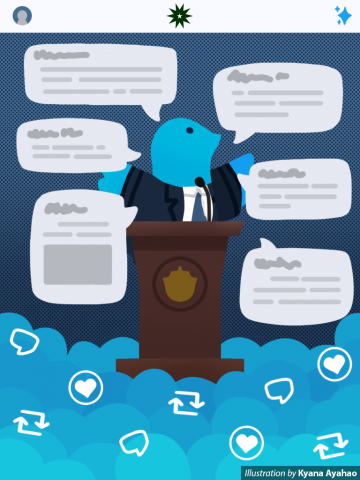
Back in May, when tensions over the West Philippine Sea were running high, Foreign Affairs Secretary Teddy Locsin “politely” told China on Twitter to leave the contested region, describing the country as an “ugly oaf forcing your attentions (sic) on a handsome guy who wants to be your friend.”
No stranger to colorful remarks on social media, Locsin has managed to use his verified account to not only provide updates from his department but also broadcast his unfiltered opinions and attack government officials and foreign dignitaries—and, in some cases, his own Twitter followers. But this is only one of many examples where government officials use Twitter as a tool to reach niche audiences and expand their influence by being casual in the way they convey information, both official announcements and their personal views.
Social media as a political tool
During the advent of new media in the 2000s, e-governance and e-participation showed promise. “It was the idea that the internet will facilitate the accessibility of government services, including politicians, where there might be room for ordinary citizens to be able to engage with politicians,” says Department of Communication Full Professor Dr. Cheryll Ruth Soriano, whose research focuses on the implications of digital communication on socio-cultural and political practices.
This vision became true as politicians and diplomats tapped social media sites to engage with their audience more directly and bypass traditional gatekeepers like the media. For Fatima Gaw, an assistant professor from University of the Philippines Diliman and a researcher on digital technologies in culture and politics, this absence of gatekeepers is “liberating for a politician who wants to be always present in the public eye [and] in the public opinion.”
Traditionally, mounting a political campaign requires enormous funding despite only reaching a limited audience since these campaigns are geographically limited by the localities they can afford to visit. Adding to these expenses are political advertisements paid for to be aired on television outlets. Since public political campaigns do not fully reach these candidates’ target audiences, Soriano thinks that Filipino politicians resort to promoting their campaigns on Twitter to reach the electorate, especially their supporters.
Blurring boundaries
Using Twitter allows Filipino politicians to let constituents look past their bureaucratic persona by giving them a glimpse into their private lives, a move which Gaw says can create an air of authenticity and relatability around a public official.
“Since you are sharing a part of yourself, it’s easier to trust somebody than somebody you don’t know anything about,” she reasons.
Soriano, meanwhile, says that there is an appeal in seeing state figures, who are often viewed in a formal setting, step out of their zone and instead appear “raw” and “authentic” to their audiences. “There is an attractiveness to that, but also an organic nature of social media communication kasi nga it invites participation; it invites clicks,” she elaborates.
This need to come off as informal may have arisen from their need to “buy into the language of Twitter” and meet their followers’ expectations, Soriano adds. “Hindi naman mage-expect ‘yung mga Filipino Twitter users, kahit na state actor ka, na sobrang formal kasi no one will really engage with you if that is so.”
(Filipino Twitter users will not expect you to be too formal, even if you are a state actor, because no one will really engage with you if that is so.)
Social media also offers politicians the freedom to express themselves and “dominate the conversation about a specific issue,” according to Gaw. This, she adds, when combined with the ability to publish anytime to a captive audience, makes it a “perfect recipe” to transform oneself into a “more forceful political presence” than politicians who are not on the platform and who still rely on traditional media to get their message across.
“You can already manicure or portray yourself in a way that you think would be strategic for your political career or an agenda,” she simplifies.
No holds unbarred
However, these strategies will only remain effective if balanced properly. While political figures are given the opportunity to portray themselves in whatever way they deem advantageous, they are still expected to remain respectable as individuals. As Gaw warns, “There’s possible backlash to it—if you cross certain lines and you say certain things or offend groups of people.”
Soriano cites an incident under the Aquino administration where one of the president’s speechwriters caused an online uproar after tweeting off the cuff remarks during a state visit in Vietnam, commenting, for example, how crossing the streets of Hanoi is “one of the easiest ways to die.” While sharing informal life updates is normal on a microblogging platform like Twitter, state actors can “get castigated for what they tweet” because of the positions they hold, she says.
And in the event they do get backlash, there is little recourse after as deleting the tweet would also put them at a disadvantage.
“You cannot edit it and people can screengrab it, and even if you delete it, people have a resibo of it already,” Soriano details, noting that even if they are tweeting in a personal capacity, their statements will be perceived as representative of the organizations or offices they belong to.
On the other hand, Gaw believes that though there may be instances where public individuals could face backlash, the effect may not always be permanent. “I don’t think there’s going to be risk or danger to you, unless you release something offensive that will really offend people,” she maintains.
She, then, advises voters to heighten their discretion toward how politicians “package” themselves as well as to question their intentions as the coming months will be noisier, with several influencers tapped to endorse various political candidates for the approaching elections.
“Look at Twitter with a sharper lens; it’s possible that they are indeed performing their true selves,” Gaw says. “But [what] their intent in doing so is the question.”
